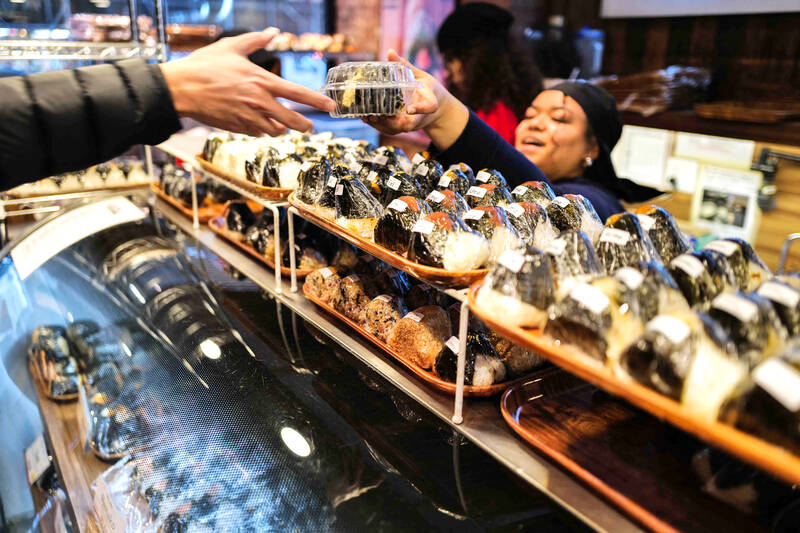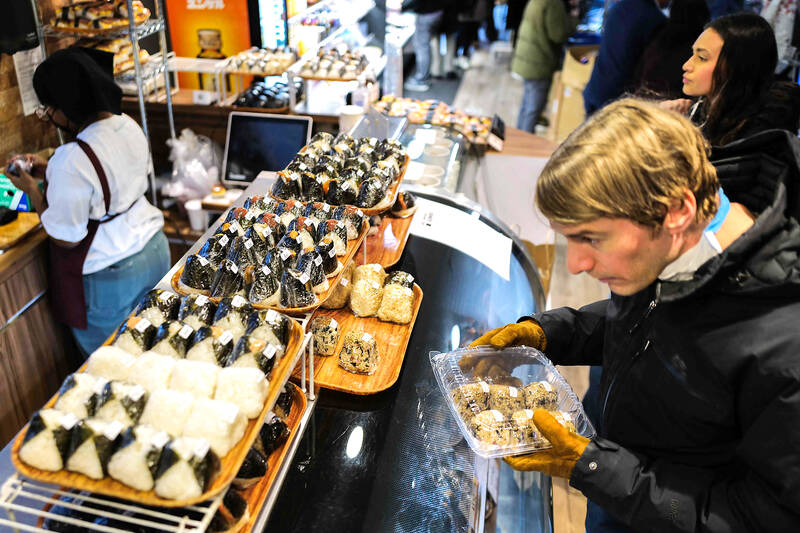Wrapped in seaweed and stuffed with delicious fillings, onigiri rice balls are shaking off their reputation as a cheap and uninspiring snack in Japan — and enticing hungry converts abroad.
Mouth-watering pictures on social media, rising demand for affordable lunches, and a surge in tourism to Japan are all drawing people to the humble onigiri.
Just ask any of the 50-odd customers lined up in a quiet corner of Tokyo for the restaurant Onigiri Bongo to open.

Photo: AFP
In the past, “no one came between lunch and dinner, but now customers queue non-stop,” said 71-year-old Yumiko Ukon, who runs the more than half-century-old shop.
Some wait for eight hours, said Ukon, whose team makes some 60 different types of onigiri, bulging with traditional fillings like pickled plum, or more unusual offerings such as bacon with soy sauce.
Onigiri Bongo only has nine counter seats, but sells around 1,200 rice balls each day.

Photo: AFP
“When I was young, onigiri was something you would make at home,” Ukon said. “Now people buy onigiri, or go out to have onigiri.”
Long popular as on-the-go fuel in Japan, onigiri have been eaten for over a millennium in the country, where they were once taken onto the battlefield by samurai.
The quick bites can be found in convenience stores on practically every corner, ubiquitous enough to be banal.
But with more visitors than ever flocking to Japan, and the country’s pop culture booming in popularity, onigiri are now also becoming a lunch option overseas.
Japanese rice ball chain Omusubi Gonbei has opened outlets in Paris and near Grand Central Station in New York.
“It’s light, healthy and easy to eat,” said 53-year-old customer Sean King, who first tried onigiri in Japan and was “very happy” to find them in the Big Apple.
“You don’t have any regrets after eating one.”
AFFORDABLE LUNCH
The oldest rice ball restaurant in Tokyo, Onigiri Asakusa Yadoroku, was included in the 2019 Michelin Guide, elevating the status of the snack.
“From that moment, people who saw onigiri as an everyday bite to eat began to see it as a quality dish,” said Yusuke Nakamura, president of Japan’s Onigiri Society.
Spending on onigiri and other pre-prepared rice products has grown by 66 percent over the past two decades in Japan, figures from the internal affairs ministry show.
In 2022, onigiri were the second-most-frequently purchased ready-to-eat food in Japan after bento lunchboxes, according to the Japan Ready-made Meal Association.
And the number of specialized onigiri shops is rising quickly, Nakamura said.
The trend has been driven by demand for takeaway meals during the pandemic, but also inflation, with people choosing onigiri over a restaurant meal to save money.
While imported grains like wheat have become more expensive because of the war in Ukraine, “the price of rice, grown domestically, is relatively stable”, Nakamura explained.
Japanese people have deep cultural links to rice, said Miki Yamada, who runs Warai Musubi, a catering service specializing in omusubi — another name for onigiri.
In the Shinto religion, “rice is an offering made to deities,” and the traditional triangular shape of onigiri may be a reference to mountains, where many Shinto gods dwell, the 48-year-old said.
‘PREMIUM’ RICE BALLS
Yamada, whose family are rice farmers in Fukushima, realized the potential of onigiri after thinking up ways to promote rice from the region after the 2011 nuclear disaster.
She began posting pictures of her perfectly presented rice balls on social media, and the business grew from there.
Onigiri shops usually can’t afford advertising, but online posts by fans showing different varieties of the colorful dish have played a big role in their new popularity, the Onigiri Society’s Nakamura said.
Younger customers are also attracted by “premium” rice balls made with quality ingredients, with various other cereals mixed in to make them more nutritious.
Miyuki Kawarada, 27, is president of Taro Tokyo Onigiri, which opened two shops in the capital in 2022 selling top-quality onigiri at up to 430 yen (US$2.85) each.
Kawarada wants to open dozens of onigiri restaurants abroad and thinks the snack could one day dethrone sushi as Japan’s best-known culinary export.
Onigiri “can be vegan, or halal, and can be adapted to suit different cultures,” she said.
“In Japan, but also abroad, I want to renew the stuffy, old-fashioned image of rice.”

June 9 to June 15 A photo of two men riding trendy high-wheel Penny-Farthing bicycles past a Qing Dynasty gate aptly captures the essence of Taipei in 1897 — a newly colonized city on the cusp of great change. The Japanese began making significant modifications to the cityscape in 1899, tearing down Qing-era structures, widening boulevards and installing Western-style infrastructure and buildings. The photographer, Minosuke Imamura, only spent a year in Taiwan as a cartographer for the governor-general’s office, but he left behind a treasure trove of 130 images showing life at the onset of Japanese rule, spanning July 1897 to

One of the most important gripes that Taiwanese have about the Democratic Progressive Party (DPP) is that it has failed to deliver concretely on higher wages, housing prices and other bread-and-butter issues. The parallel complaint is that the DPP cares only about glamor issues, such as removing markers of Chinese Nationalist Party (KMT) colonialism by renaming them, or what the KMT codes as “de-Sinification.” Once again, as a critical election looms, the DPP is presenting evidence for that charge. The KMT was quick to jump on the recent proposal of the Ministry of the Interior (MOI) to rename roads that symbolize

On the evening of June 1, Control Yuan Secretary-General Lee Chun-yi (李俊俋) apologized and resigned in disgrace. His crime was instructing his driver to use a Control Yuan vehicle to transport his dog to a pet grooming salon. The Control Yuan is the government branch that investigates, audits and impeaches government officials for, among other things, misuse of government funds, so his misuse of a government vehicle was highly inappropriate. If this story were told to anyone living in the golden era of swaggering gangsters, flashy nouveau riche businessmen, and corrupt “black gold” politics of the 1980s and 1990s, they would have laughed.

In an interview posted online by United Daily News (UDN) on May 26, current Chinese Nationalist Party (KMT) Chairman Eric Chu (朱立倫) was asked about Taichung Mayor Lu Shiow-yen (盧秀燕) replacing him as party chair. Though not yet officially running, by the customs of Taiwan politics, Lu has been signalling she is both running for party chair and to be the party’s 2028 presidential candidate. She told an international media outlet that she was considering a run. She also gave a speech in Keelung on national priorities and foreign affairs. For details, see the May 23 edition of this column,